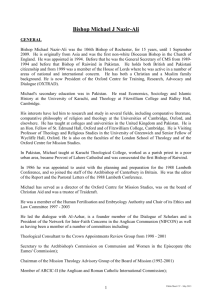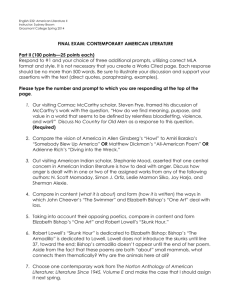Document 10774166
advertisement
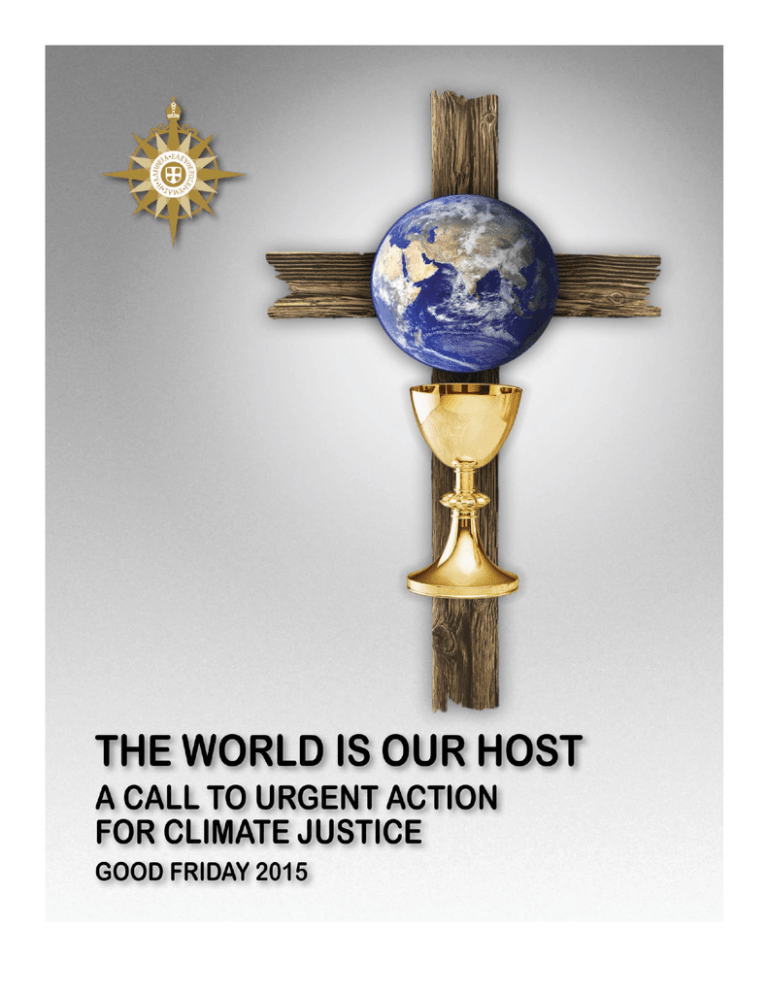
THE WORLD IS OUR HOST A CALL TO URGENT ACTION FOR CLIMATE JUSTICE Volmoed Conference and Retreat Centre (A Community of the Cross of Nails Partner), South Africa, 23 to 27 February 20151 In the name of God, Father, Son and Holy Spirit, Amen. We, a group of Anglican Bishops from dioceses across our global Communion greet our sisters and brothers in Christ throughout the Anglican Communion on this most Holy Day, Good Friday. On this day, when our Saviour poured out his very life for the world, we share the following statement in a spirit of sacrificial and reconciling love. The covetous desires of people and nations to possess what is not their own, Father, forgive. The greed which exploits the work of human hands and lays waste the earth, Father, forgive.2 At this time of unprecedented climate crisis, we call all our brothers and sisters in the Anglican Communion to join us in prayer and in pastoral, priestly and prophetic action. We call with humility, but with urgent determination enlivened by our faith in God who is Creator and Redeemer and by the pain of our people’s experience in our dioceses and provinces, and their need for seeds of hope. In different ways each of our own dioceses are deeply impacted by climate injustice and environmental degradation. We accept the evidence of science concerning the contribution of human activity to the climate crisis and the disproportionate role played by fossil-fuel based economies. Although climate scientists have for many years warned of the consequences of inaction there is an alarming lack of global agreement about the way forward. We believe that the problem is spiritual as well as economic, scientific and political, because the roadblock to effective action relates to basic existential issues of how human life is framed and valued: including the competing moral claims of present and future generations, human versus non-human interests, and how the lifestyle of wealthy countries is to be balanced against the basic needs of the developing world. For this reason the Church must urgently find its collective moral voice. 1 Volmoed means ‘’full of courage” From the Coventry Litany of Reconciliation, see www.coventrycathedral.org.uk/about-us/our-reconciliation-ministry/coventrylitany-of-reconciliation.php 2 The World is our Host, page 2 Over the past year, facilitated by the steering group of the Anglican Communion Environmental Network (ACEN) we were invited through email, personal study, and virtual conferencing, to begin considering how we might live out, with urgency and in hope, the Fifth Mark of Mission “to strive to safeguard the integrity of creation and sustain and renew the life of the earth.” We want God’s justice. Whose justice is that? Bishop Nathaniel Nakwatumbah, Namibia Our reflections entered a new depth when, in February 2015, ACEN chair Archbishop Thabo Makgoba graciously hosted a face to face meeting in South Africa. This gave us further opportunity to share the experience of our dioceses and, within a context of daily Eucharist and prayer, to hear again God’s calling in Scripture and in Creation (Psalms 104, 148, 24) and to discern ways forward. We held fast to our hope in the promises of God, the one who will restore all creation (Romans 8:18-25) and who will make all things new (2 Corinthians 5:17; Revelation 21:5). We listened to stories from dioceses affected by increasingly strong and more frequent extreme weather events; changes in seasonal weather patterns; rising levels of seawater; acidification of seawater and depleted fishing grounds; the devastating impacts of pollution; deforestation, and destructive mining and energy extraction and transportation practices. We lamented the displacement of people because of the effects of climate change and environmental degradation, and the consequent loss of culture, identity and belonging. We know that God committed the care of creation to us, God’s children (Genesis 1:28-29, 2:15) but we have been care-less (Jeremiah 2:7). Therefore climate justice for us as Christians demands a faith response. Together we struggled with the practical and spiritual dimensions of climate justice in light of the insights and imperatives of our Christian faith. We recognized that some of us serve in cultures and nations that are major contributors to global warming, while others live in places which contribute little An indigenous cosmology gives access to Scripture. So the call is to go back to the Bible. It’s said that God has planted in our elders a seed of what the future may look like. Bishop Mark MacDonald, National Indigenous Bishop, Canada to the problem but are disproportionately affected by it. We also acknowledge in humility the cultural, political, historical and theological differences between us that we struggle to set aside in framing a united response to this crisis. The language we use to confront this issue and the interests and powers we must confront vary significantly from place to place. The crisis is however shared, and its resolution can only lie in increasing The World is our Host, page 3 unity of thought and practice in order to demolish hurdles to inequality and injustice in our common life. We shared the understanding that creation is holy, and that we are called to serve (ebed) and protect (shamar) the earth now and for future generations (Genesis 2:15). We recognized that we have been complicit in a theology of dominion (Genesis 1:26), and realized that human dominion over the earth can only be exercised in the light of Jesus’ command that the greatest is the one who serves (Luke 22.26). We acknowledged that there are large economic and political issues at play in this complex conversation around unexploited fossil fuel reserves and the development of sustainable and renewable forms of energy: including the subsidization of fossil fuel industries and the We need to make our communities equal – as in the Eucharist. We consecrate enough but not more. Jesus died for all humanity equally. Bishop Ellinah Wamukoya, Swaziland powerful influence of big business on government policy throughout the world. We believe that the voices of Indigenous peoples, whose relationship with creation remains integral to their spirituality and relationship with God, is of central importance to ongoing ministry on We don’t need any more scientific evidence. We are experiencing climate change now and we need immediate action. If we simply wait we will find our houses under water. How do I respond as Bishop when people say” ‘Well, God told Noah that he’d never flood the land again.’ Bishop Apimeleki Qiliho, Vanua Levu and Taveuni, Fiji climate justice. We were profoundly moved as we participated in an Indigenous Eucharistic rite which connected Creation, Morality, and Redemption in a biblical, integral and comprehensive way. We were painfully aware that women frequently bear a disproportionate burden of climate change largely because they make up the majority of the world's poor and are often more dependent for their livelihood on natural resources threatened by climate change. The voices and contributions of women are therefore essential in responding to climate change. There is a compelling need to listen to the voices of our youth who will inherit the challenges and catastrophes we fail to address and preempt. We believe we must be reconciled to Creation and to one another and that there is an urgency to this call. We believe the issue of climate change is a moral issue at its heart. We acknowledged that salvation in Christ calls us to responsibilities beyond ourselves. Especially in the developed world our view of salvation has often focused on our individual souls and journey to The World is our Host, page 4 heaven. Our responsibility to care for God’s Creation has been overlooked or ignored. We have acted as if Christ only died to save the human race. The truth of the redemption of all things in Christ, which is the message of the life-giving cross, must be reclaimed3 (Colossians 1:20; John 3:16). Listening to one another we learned that attending to the current and future life and health of our planet will require sacrifices now, both personal and collective, a deeper appreciation of the interdependence of all creation, and a genuine commitment to repentance, When the Pope visited the epicenter of typhoon Haiyan, he met a little girl. She asked the pope why is this happening to children. She had lost her whole family, she was the only survivor. Our work is for that child. Bishop Jonathan Casimina, Davao, Philippines reconciliation and redemption. This calls for a profound change of heart and mind. In keeping with 1 Corinthians 12:26, our study and discussions served to underline the connection between lifestyle and use of resources in one part of the world affecting the whole. We discerned a call to revitalize our human vocation that refuses to leave some poor and others rich, and to rediscover our joy and awe in the wonders of God’s creation (Psalm 96: 11-12). We were challenged to go beyond advocacy for action by governments and big business interests, and undertake to practice the way of repentance and restraint, practicing justice between north and south, male and female, human and the more-thanhuman creation within our own common life as a Church. Weather systems are moving south. The rain is now falling in the ocean instead of on the land. Southern Australia is drying out. Bush fires – some have had to extinguish themselves by running out of bush to burn. Bishop Tom Wilmot, Perth, Australia The churches of the Anglican Communion are local and global. Rooted in our theology of creation and in solidarity with one another we can take responsibility for action across the Communion, using all our God-given resources of intellect, spirit and determination. To live in the way of our Saviour, who unites all to himself, we therefore commit ourselves to the following initial actions and to developing a strategic plan of action in the months ahead. The initiatives listed below are important first-steps as we call upon Anglicans everywhere to join us in these endeavours: 3 cf Atkinson D: Climate Change and the Gospel: Why we in the churches need to treat climate change more urgently, Epiphany 2015 http://operationnoah.org/category/resources/theology/ The World is our Host, page 5 As bishops in our provinces, dioceses, congregations and communities: We commit ourselves as brothers and sisters in Christ in humility, and acknowledging our differences of circumstance and polity, to support one another in conversation and in prayer, to continue to discern God’s leading, to develop ecotheological resources and form strategic proposals for global and local action. We undertake to fast for climate justice on the first day of every month4 in solidarity with the earth and in acknowledgement that our own common life as a Church has contributed to the current climate crisis. Our fast will continue for as long as we prayerfully discern that we stand in need of repentance as a Church. We will work to strengthen our ecumenical and inter-faith partnerships globally and in our own jurisdictions5 standing in solidarity with all people of goodwill in response to the climate crisis. We will develop and distribute educational resources for everyone (adults, youth and children) on climate change, climate justice, and the ethical and practical principles of sustainable living in global and local contexts. We will develop and distribute liturgical materials on Care for Creation for use in parishes and other places of worship. We call for a review of our churches’ investment practices with a view to supporting environmental sustainability and justice by divesting from industries involved primarily in the extraction or distribution of fossil fuels. We call for the strengthening of ethical investment guidelines to include consideration of justice for the non-human creation as well as the interests of future generations of humanity.. We call for programmes of theological formation for ordinands, and in-service formation for ordained clergy, to include in-depth components of eco-justice and ecotheology. We call for Anglican educational institutions to integrate issues of environmental sustainability and ethics into their curricula and community life and by teaching a theological approach to climate justice. 4 http://fastfortheclimate.org/en/ http://www.prayandfastfortheclimate.org.uk/ We were inspired by the Orthodox Patriarch Bartholomew. We received a message from Antje Jackelen, Archbishop of Uppsala, Church of Sweden. We await with eager anticipation the forthcoming Papal encyclical ... and draw hope from the ways in which Christians around the world are recognizing the priority and urgency of this issue 5 The World is our Host, page 6 We encourage Anglicans everywhere to: Join in prayer and fasting for climate justice on the first day of each month6 as an integral part of life and worship. Implement energy conservation measures in church buildings and moving to renewable energy sources as quickly as possible. Take measures to conserve, recycle and collect water around church buildings and properties. Nurture biodiversity on church land by creating safe habitat for indigenous species. Support local communities by sharing water, energy and arable land resources for local food production. Support sustainable land use initiatives, including a halt to the clearing of native forests. Advocate for sustainable water, food, and agricultural practices in our communities. It is imperative to take into account the interwoven relationship of food, water and energy systems. We call upon political, economic, social and religious leaders in our various constituencies to address the climate change crisis as the most urgent moral issue of our day. 7 We urge them to: Work with all possible commitment and speed toward fair, ambitious, accountable and binding climate change agreements at national and international levels. Develop policies that genuinely assist environmental and climate refugees and promote mechanisms of intergovernmental co-operation that ensure their human rights, safety and resettlement In conclusion We affirm our belief with the words of the Creed “We believe in God, the Father Almighty, Creator of Heaven and Earth.” And we affirm that this statement is foundational for the Gospel of Jesus Christ our Lord. Our declaration is offered in prayer, with thanksgiving to God, creator, sustainer and redeemer of all to whom be glory and praise, now and forever. Almighty God, You created the heavens and the earth and all that is in them. And you created humankind in your own image and it was very good; Grant us the courage to recognize our failure 6 http://fastfortheclimate.org/en/ http://www.prayandfastfortheclimate.org.uk/ Our churches must immediately engage national policy makers as each nation prepares commitments for presentation at the forthcoming Paris Climate Talks, Nov 30 – Dec 7, 2015. 7 The World is our Host, page 7 to maintain your creation. And by your grace help us to halt the degradation of our environment. Through Jesus Christ our Lord, Who came that we might have life in all its fullness. Amen. 8 The Initiative was attended by the following Bishops The Archbishop of Cape Town and Primate of the Anglican Church of Southern Africa, the Most Revd Dr Thabo Makgoba The Bishop of Edmonton, Anglican Church of Canada, the Rt Revd Jane Alexander The Bishop of Western Kowloon, Hong Kong Sheng Kung Hui, the Rt Revd Andrew Chan The Bishop of Davao, Episcopal Church of the Philippines, the Rt Revd Jonathan Casimina The Primus of the Scottish Episcopal Church and Bishop of St Andrews Dunkeld & Dunblane, the Most Revd David Chillingworth The Bishop of New York, The Episcopal Church, the Rt Revd Andrew Dietsche The Bishop of Northern Argentina, Anglican Church of South America, the Rt Revd Nicholas Drayson The Bishop of Harare, Church of the Province of Central Africa, the Rt Revd Dr Chad Gandiya The Bishop of Salisbury, Church of England, the Rt Revd Nicholas Holtam The National Indigenous Bishop, Anglican Church of Canada, the Rt Revd Mark MacDonald The Bishop of Eastern Zambia, Church of the Province of Central Africa, the Rt Revd William Mchombo The Bishop of Johannesburg, Anglican Church of Southern Africa, the Rt Revd Stephen Moreo The Bishop of Namibia, Anglican Church of Southern Africa, the Rt Revd Nathaniel Nakwatumbah The Bishop of Madhya Kerala and Deputy Moderator of the Church of South India, the Rt Revd Thomas Oommen The Bishop of Vanua Levu and Taveuni, Fiji, Anglican Church in Aotearoa, New Zealand & Polynesia, the Rt Revd Apimeleki Qiliho The Bishop of Swaziland, Anglican Church of Southern Africa, the Rt Revd Ellinah Wamukoya The Assistant Bishop of the Diocese of Perth, Anglican Church of Australia, The Rt Revd Tom Wilmot The Moderator Bishop, Church of Bangladesh & Bishop of Dhaka, the Most Revd Paul Sarker, and the Bishop of Amazon, Episcopal Anglican Church of Brazil, the Rt Revd Saulo Mauricio de Barros, and the Bishop of Iglesia Episcopal de Cuba, Bishop Griselda Delgado have participated in the initiative but were unable to attend the meeting. The statement and its contents are Copyright: The Anglican Consultative Council and the Anglican Communion Environmental Network 2015. Permission is given to reproduce portions for publication. Copies may be made for distribution with appropriate citation. We acknowledge with gratitude the support of the Archbishop of Canterbury’s Anglican Communion Fund and Tearfund in making this initiative possible. 8 From Season of Creation ONE, http://www.greenanglicans.org/resources/liturgical/ The World is our Host, page 8
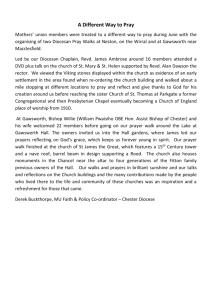
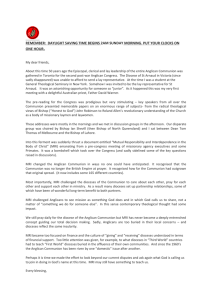
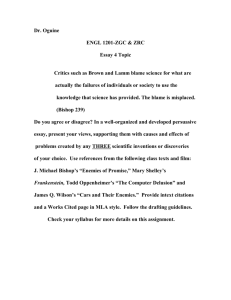
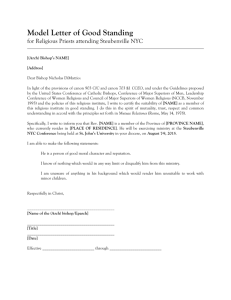
![An approach to answering the question about Elizabeth Bishop[1]](http://s3.studylib.net/store/data/008032916_1-b08716e78f328a4fda7465a9fffa5aba-300x300.png)

